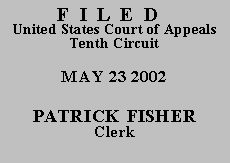

Proceeding pro se, the plaintiff Juan Manuel Vasquez, a state prisoner in the custody of the New Mexico Department of Corrections, filed this action pursuant to 42 U.S.C. § 1983. In his Complaint, Mr. Vasquez alleges that the state of New Mexico had confined him in a county jail in violation of a state statute. He further alleges that, because he had pursued litigation against the state, the state retaliated against him by "taking all Law Libraries in the State," by no longer providing "Case Law forms" or typewriters for legal research, and by censoring his mail. Rec. doc. 1, Attachment 1, at 3 (Complaint, filed Mar. 19, 2001). Mr. Vasquez added that the state had not provided a lawyer or a legal assistant to advise him.
Pursuant to 28 U.S.C. § 1915(e)(2), the district court dismissed Mr. Vasquez's complaint. The court reasoned that Mr. Vasquez had failed to allege an actual injury arising out of a denial of access to legal materials and legal assistance. Additionally, the court stated, Mr. Vasquez's allegation of denial of access to the courts was "squarely contradicted by the fact that [his] complaint was mailed to the court." Rec. doc. 6, at 3 (District Court Order, filed Apr. 6, 2001). The court further held that Mr. Vasquez's allegations of retaliation were conclusory. We agree with the district court that Mr. Vasquez's Complaint fails to state a claim upon which relief may be granted.
An inmate alleging a violation of constitutional access to the courts "must show actual injury." Lewis v. Casey, 518 U.S. 343, 349 (1996); Penrod v. Zavaras, 94 F.3d 1399, 1403 (10th Cir. 1996) (per curiam) (interpreting Lewis ). Thus, the allegation that a prison's library is inadequate is insufficient to allege the denial of the constitutional right of access to the courts. See Lewis, 518 U.S. at 351. Instead, an inmate "must go one step further and demonstrate that the alleged shortcomings in the library . . . hindered his efforts to pursue a legal claim." Id. Here, Mr. Vasquez's complaint does not allege such an actual injury.
As to the allegation of retaliation, we agree with the district court that Mr. Vasquez has failed to allege the specific facts necessary to support such a claim. Even under the liberal pleading standards applied to pro se litigants, "conclusory allegations without supporting factual averments are insufficient to state a claim upon which relief can be based." Hall v. Bellmon, 935 F.2d 1106, 1110 (10th Cir. 1991); see also Peterson v. Shanks, 149 F.3d 1140, 1144 (10th Cir. 1998) ("An inmate claiming retaliation must allege specific facts showing retaliation because of the exercise of the prisoner's constitutional rights.") (internal quotation marks omitted).
Finally, Mr. Vasquez's allegations regarding the violation of a New Mexico state statute are insufficient to allege a § 1983 claim. Section 1983 provides a remedy for the deprivation of rights protected by federal rather than state law. See Collins v. City of Harker Heights, Tex., 503 U.S. 115, 120-21 (1992); see also Romero v. Fay, 45 F.3d 1472, 1481 (10th Cir. 1995) (holding that an allegation that a defendant prosecuted the plaintiff in violation of New Mexico law was insufficient to allege a violation of federal law under § 1983). Moreover, the Supreme Court has held that "[t]he Constitution does not . . . guarantee that the convicted prisoner will be placed in any particular prison." Meachum v. Fano, 427 U.S. 215, 224-25 (1976). Thus, Mr. Vasquez's allegation that the defendants violated New Mexico law in confining him in the county jail is insufficient to allege a violation of federal law.
Accordingly, we AFFIRM the district court's dismissal of Mr. Vasquez's Complaint pursuant to 28 U.S.C. § 1915(e)(2)(B)(ii) because the Complaint fails to state a claim upon which relief may be granted.
Entered for the Court,
Robert H. Henry
Circuit Judge
*. This order and judgment is not binding precedent, except under the doctrines of res judicata, collateral estoppel, and law of the case. The court generally disfavors the citation of orders and judgments; nevertheless, an order and judgment may be cited under the terms and conditions of 10th Cir. R. 36.3.